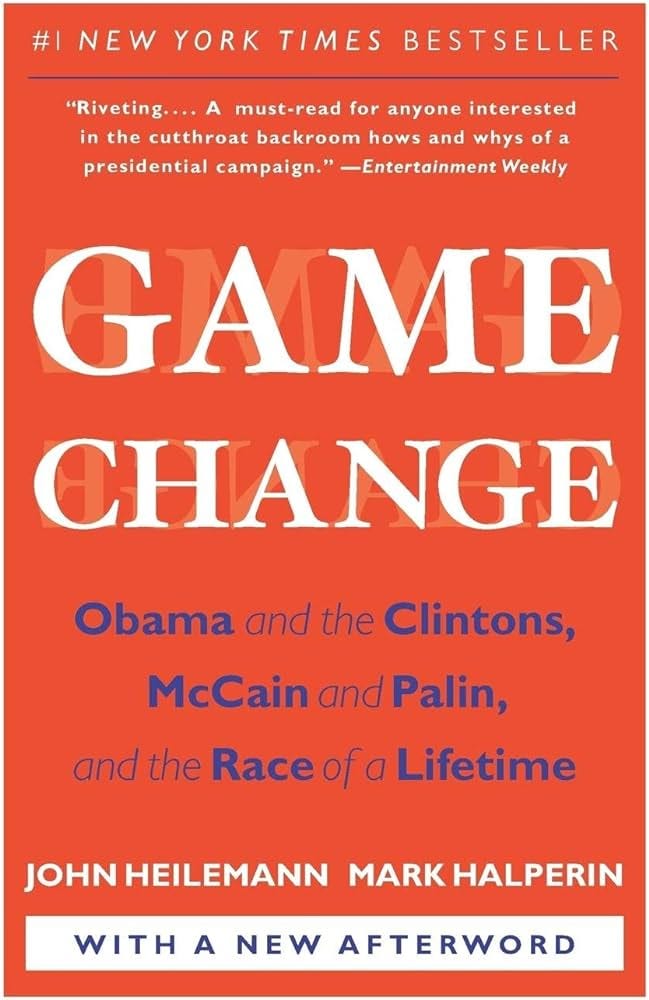What to Read Next: Time to Get Political
Issue #296: Featuring "All the King's Men" and "Game Change"
Happy Friday, readers!
For as cynical as I am about the state of American politics, I’ve been irrevocably drawn to the subject ever since my presidential biographies reading project. Though I took a couple of years (mostly) off from political reading, now that we’re coming up on one year out from the ‘24 election, I’ve been pulled back in.
All the King’s Men, the 1947 Pulitzer winner for fiction, was on my shelf for years before I read it last week. Game Change, all about the 2008 presidential campaign, was similarly on my list for a long time and it turned out to be a rollicking, entertaining stroll through a simpler political era.
Let’s jump in.
Pulitzer Update
All the King’s Men was my fourth completed Pulitzer title. Yesterday, I finished my fifth, which was the very first winner in the history category: With Americans of Past and Present Days by Jean Jules Jusserand, published in 1916. I was pleasantly surprised with how readable and interesting it was; more on that next Friday.
Up next: Bruce Catton’s A Stillness at Appomattox, the 1954 winner in the history category. This title is actually the third book in Catton’s Civil War trilogy, which has been on my shelf for years. So, I’m taking the opportunity to read the whole set.
Check out my public spreadsheet to stay up-to-date with my progress. I’ve recently added links to my posts/reviews for books that I’ve read.
All the King’s Men by Robert Penn Warren
“Maybe a man has to sell his soul to get the power to do good.”
Published: 1946 | Pages: 438 | Genre: Fiction
Though he’s not as well known today, Robert Penn Warren was one of the most prolific and versatile authors of the 20th century. He published dozens of books in total, writing novels, histories, children’s books, and poetry. In fact, Warren is the only author to have won Pulitzer Prizes in both fiction (1947) and poetry (1958, 1979).
In the 21st century, he’s probably best known for his Pulitzer-winning novel, All the King’s Men.
Narrated by journalist-turned-political-aide Jack Burden (a name laced with meaning), we follow his work for Louisiana Governor Willie Stark. Though Stark is fictional, he was modeled after the real-life Huey Long, known for his corrupt administration and eventual assassination. From the outset, then, readers know that Stark will be dead by the end of the novel.
As such, the real power of this story lies in the journey and not the destination. Burden is sometimes uncomfortable with Stark’s orders and tactics, but never really hesitates to carry them out. Eventually, though, Stark goes too far and Burden gets to the ultimate question of the book: “Maybe a man has to sell his soul to get the power to do good.”
Beyond the story itself, the writing was as hypnotic as I’ve ever encountered in a novel. It was lyrical but never pretentious; Warren’s use of long paragraphs and numerous uses of “and” rather than punctuation could have made the reading difficult, but instead just pulled me into the pages. I wasn’t always excited to pick it back up — I don’t quite know why — but never failed to be mesmerized by the prose.
All the King’s Men is going to stick with me and remains a worthwhile read eighty years later.
Game Change: Obama and the Clintons, McCain and Palin, and the Race of a Lifetime by John Heilemann and Mark Halperin
“You have two choices, [Plouffe] told Obama. You can stay in the Senate, enjoy your weekends at home, take regular vacations, and have a lovely time with your family. Or you can run for president, have your whole life poked at and pried into, almost never see your family, travel incessantly, bang your tin cup for donations like some street-corner beggar, lead a lonely, miserable life.”
Published: 2010 | Pages: 448 | Genre: Non-Fiction (Politics)
Given the unpredictability of our last two elections, it’s easy to forget that 2008 was also quite a wild campaign. In many ways, and according to numerous historians, that election actually marked the start of our current ultra-divisive political era.
The narrative reads like a soap opera — in the best, most entertaining way. The first two-thirds of the book covers the Democratic primary, which started with Hillary Clinton as the frontrunner, Jonathan Edwards as the up-and-comer, and Barack Obama as a far-off longshot. What was especially interesting here was the reminder of the sheer unlikeliness of Obama’s ascendance. He went from state senator to president-elect in three years — a political rise unlike any other.
On the Republican side, John McCain’s status roller-coastered a few times, but the real shock at the time was his out-of-left-field choice of Sarah Palin as his running mate — a move orchestrated less by McCain himself than by his cunning staff.
The final part of the book went into the election itself, which wasn’t terribly close. There was plenty of drama, though, given the onset of the Great Recession, which tanked the economy mere weeks before voters went to the polls.
Again, this is stuff that all of us know, but is easy to forget.
I was always eager to pick up Game Change, even though I knew all the plot twists — if that’s not a sign of a well-written book, I don’t know what is. Though the drama pales in comparison to what we experienced in 2016 and 2020, I think it’s worth reading about the last few “normal” elections, if for no other reason than to remind ourselves of how we got to our current moment. Our memory, or lack thereof, impacts the future far more than is obvious.
Thanks so much for reading! I deeply appreciate your time and inbox space.
-Jeremy



